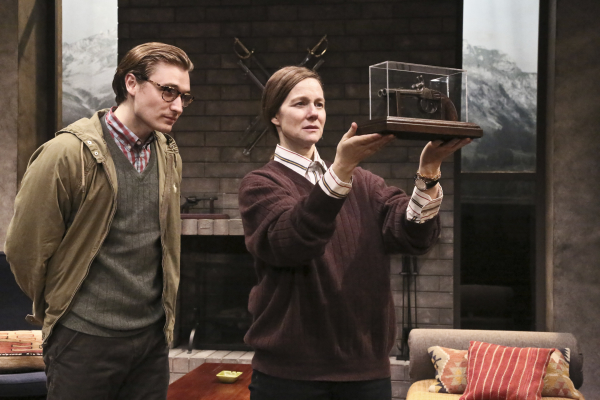Switzerland

(© Michael Lamont)
Its title notwithstanding, there is nothing remotely neutral about Switzerland, an acerbic and psychologically ticklish morsel of fun at the Geffen Playhouse. In her Los Angeles stage debut, Tony nominee Laura Linney crafts a fascinating portrayal of misanthropic mystery novelist Patricia Highsmith.
In playwright Joanna Murray-Smith's rendering, Highsmith is a racist, foulmouthed ogress — a collector of weapons and literary murders who stashed herself away in the Alps, squaring off against a younger man who gives as skillfully as he gets.
As portrayed by Linney, Highsmith is at war with her own parcel of demons and with Edward (Seth Numrich), the emissary from Highsmith's New York publishers who was dispatched to bring the writer some necessities and to convince her to write one more novel featuring her signature creation, Tom Ripley. The year is 1994 and references to e-mail and Nicole Kidman feel more anachronistic than the quite outdated typewriter on Highsmith's desk.
At this point in her career, Highsmith is wealthy and famous, with nothing more to lose or gain, beyond, perhaps, the contents of a suitcase full of peanut butter and Campbell's soup cans that Edward has toted from New York at Highsmith's bidding. Equally impervious to flattery and threats — Highsmith allegedly held a knife to the throat of one of her publishers — she lets herself crack just a tiny bit upon learning that Edward might actually have a touch of the scribe within him.
So the lady offers a proposition: If Edward can convincingly dream up the details of a fictional murder, then Highsmith will sign the contract and pen one final Ripley tale. Naturally, Edward agrees, and as with any mystery novel, things really start to get twisty. (Sadly, the central revelation is easily anticipated.)
With director Mark Brokaw at the controls and Linney and Seth Numrich ably matched, this ride promises to get turbulent. Highsmith may be a tough customer, but we are not witnessing flamboyant eccentricity. Linney accomplishes the tall order of humanizing Highsmith while still remaining true to her strident beliefs and cantankerous personality. Every remark out of her mouth is peppered with a bite or a slash (even the word "Skippy," is uttered with venom). She arches slightly at the torso and allows everything from her formless sweater and jeans to the snapping of her cigarette lighter flesh out the vengeance that lives within her body.
As is the case with Highsmith, Edward is undergoing a transformation as well, and Numrich handles both the boyish charisma and the power-shifting bravado with equal skill. When he first appears, mousy, bespectacled, forever pushing his hands through his hair, this Edward appears to be no match for the formidable Mrs. Highsmith. But if it enforces no other message, Switzerland warns against the dangers of trusting a first impression.
Brokaw navigates this dance between Linney and Numrich with the finesse of a skilled tactician. His steady vision extends to the set, where a portrait of the author, arms folded, stares severely down from one wall of the spacious single room (set designed by Anthony T. Fanning). A spiral staircase snakes to an upper room and an expanse of Alps projections flank the stage. Over the mantel: a collection of swords and pistols. Every detail is a reminder that we are in Highsmith's territory.
Equal parts psychological thriller and biographical character study, Switzerland carries a nice blend of mean-spirited amusement and some good old-fashioned suspense. Playwright Murray-Smith constructed a different type of power dynamic and showdown in her 2006 play The Female of the Species, which also riffed on the inspiration – and lethalness – of the written word. But if the lady playing the author is anything less than a force of nature, the endeavor crumbles.
Linney can add Patricia Highsmith to her ever-growing gallery of rogues. Working without heavy makeup and drawing from the character's complicated mass of hurt, fear, and ego, the actress is simply riveting. Patricia Highsmith may have written The Talented Mr. Ripley, but it is the talented Ms. Linney who carries the play in Switzerland.










